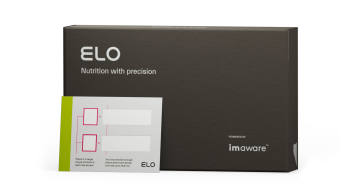Vitamin D Smart Gummies vs. Pills: Elo Health pilot study
Vitamin D is vital for health and can be acquired through diet, supplements, and sunlight. Can Elo Smart Gummies stand up to traditional pills in effectiveness?
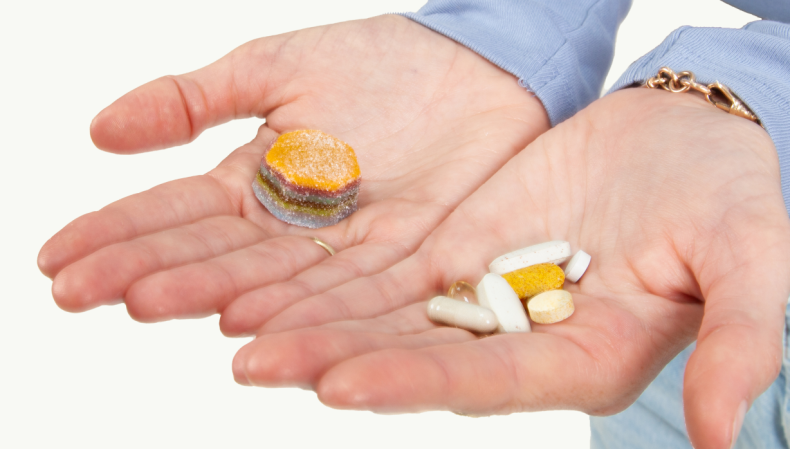
Vitamin D insufficiency plagues up to 24% of the US population, and 54% of newly enrolled Elo members exhibit low levels. Vitamin D is vital for health and can be acquired through diet, supplements, and sunlight. This pervasive issue led us to ask: Can Elo Smart Gummies stand up to traditional pills in effectiveness? Our pilot study dives deep into this question, comparing the impact of gummy vitamins to standard vitamin D pills using 25-hydroxy vitamin D blood biomarker test as a key marker.
Objectives
Test the effectiveness of gummy vitamins in raising or maintaining vitamin D serum level when compared to traditional pills
Test the likeability of gummies as a form of nutrient delivery
Background
Vitamin D is a group of fat-soluble vitamins responsible for increasing intestinal absorption of calcium, magnesium, and phosphate, and many other biological effects. Vitamin D deficiency is associated with a plethora of health problems, such as weak bones (osteomalacia), autoimmune disorders, poor immune function, muscle weakness and pain, and increased risk of cardiovascular disease and depression. Optimizing vitamin D blood levels (40 - 80 ng/ml of serum vitamin D3) may help prevent and correct some of these morbidities. Given the limited availability of vitamin D in food, supplemental vitamin offers a convenient and affordable way to correct low serum vitamin D however, dose, format, and palatability can influence compliance. 54% of newly enrolled Elo members are either severely vitamin D deficient (7%) or insufficient (47%).
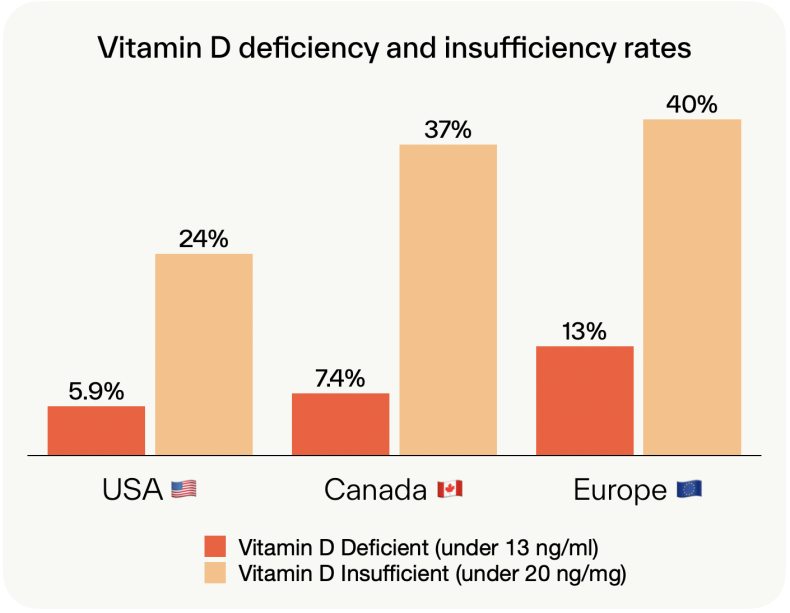
The prevalence of vitamin D deficiency (less than 13 ng/ml or < 30 nmol/L) is 6% in the USA, 7% in Canada, and 13% in Europe. Vitamin D insufficiency, (i.e. less than 20 ng/ml or < 50 nmol/L) rates have been estimated to be 24% in the USA, 37% in Canada, and 40% in Europe [1,2,3,4,5].
54% of newly enrolled Elo members are either severely vitamin D deficient (7%) or insufficient (47%).
The study
In this study, Elo Health designed personalized vitamin D dosing regimens in the form of Elo Smart Gummies (intervention) or softgel pills (control) and monitored intake and compliance via periodic surveys. The dosage was personalized to the member's own needs based on their baseline vitamin D serum levels using the Elo algorithm.
Elo Health screened 156 potential candidates for the intervention, from which 39 were enrolled. Both the intervention group and the control group were asked to sample blood by finger prick twice throughout this study: first, before the study (vitamin D baseline), and second, after the 12 weeks of daily Elo Smart Gummy supplementation. A subset of participants were asked to do an additional vitamin D assessment via venipuncture blood test before and after the end of the study to validate the finger prick results. Vitamin D baseline serum level, member’s BMI, and current vitamin D dose (if applicable) were used as inputs to generate personalized vitamin D doses using the Elo algorithm.
Participants in the intervention group received 12 week daily dose of Elo Smart Gummies containing personalized concentrations of vegan Vita-algae vitamin D3™ and one or more of the following nutrients: vitamin A, vitamin B12, vitamin C, vitamin E, vitamin K2, iron, zinc, selenium, ginseng, ashwagandha, LactoSpore probiotics, CoQ10, inositol, and folic acid. The daily vitamin D dose varied from 1,600 IU to 11,400 IU. The gummies were 3D printed by the patented technology developed inhouse by Rem3dy Health, trading as Nourished Vita-algae vitamin D3™ was sourced from a mixture of algae and lichen fungus species, which grow in the northern parts of Canada. The gummies were blackcurrant-flavored.
The control group received generic vitamin D softgels pills at a dosage of 1,000 IU, 2,000 IU, 5,000 IU, 7,000 IU, or 10,000 IU, depending on their baseline serum vitamin level per the Elo algorithm.
Study visual abstract:
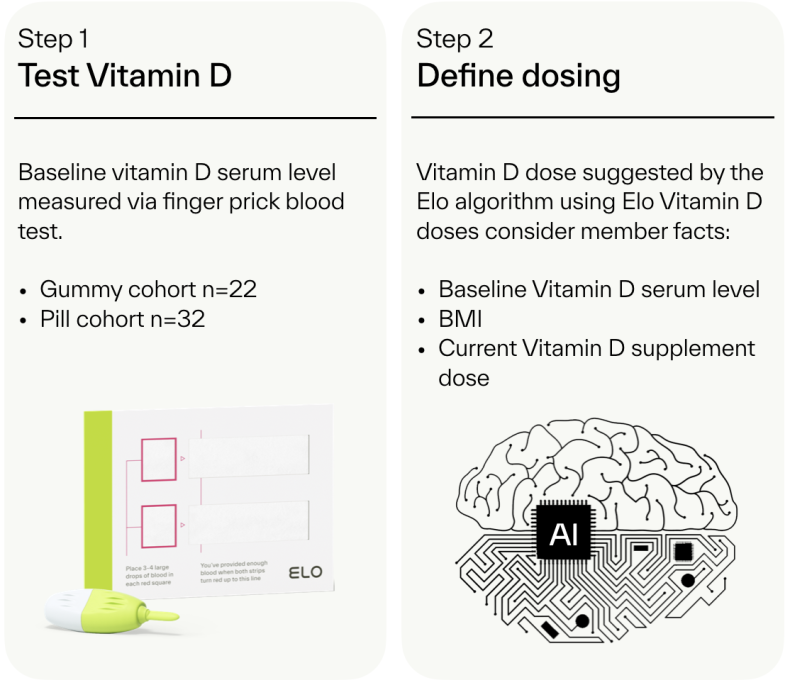
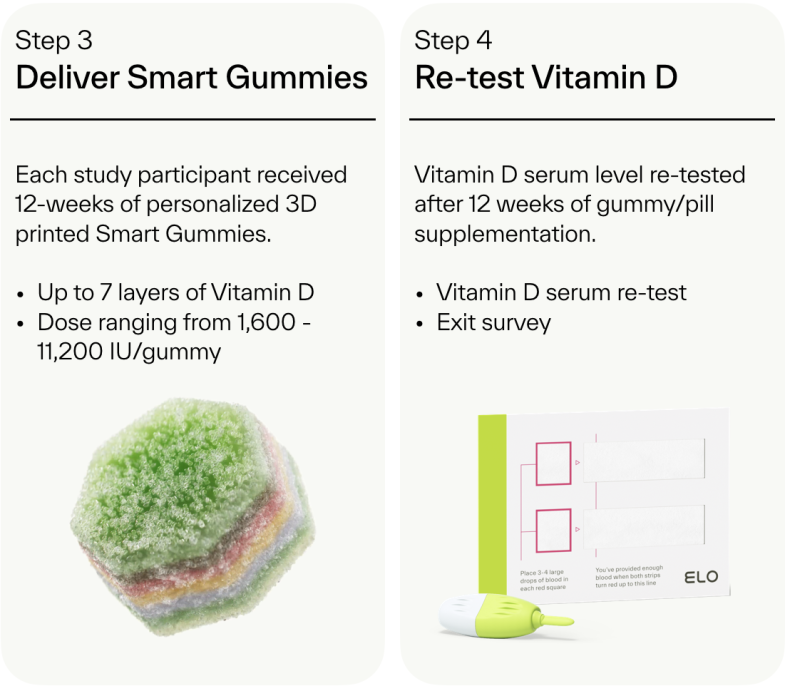
Length of intervention
Participants in the intervention group were instructed to consume one personalized Elo Smart Gummy daily for 12 weeks. Those in the control group were instructed to take one personalized vitamin D softgel pill daily for 12 weeks.
Intervention participants
Elo Health screened suitable intervention candidates from existing and new members with low vitamin D serum levels at enrollment to Elo or their latest biomarker test result. 39 healthy participants with low vitamin D levels at the baseline measurement were selected, they were vitamin D deficient (20 - <40 ng/ml) or severely deficient (10 - <20 ng/ml). In some cases, participants with a history of low vitamin D levels and currently taking vitamin D supplements were also selected to participate. Their current vitamin D supplement was replaced by the Elo Smart Gummy supplement with a closely matching vitamin D dose.
Intervention group inclusion criteria (assessed via a survey):
History of low vitamin D and/or currently on personalized vitamin D supplementation in their Elo supplement plan.
Willingness to do at-home biomarker test using finger prick and dry blood spot card.
Willingness to do an additional vitamin D test via venipuncture at QuestLab or LabCorp
Vitamin D deficient (20 - < 40 ng/ml) or severely deficient (10 - < 20 ng/ml) at baseline
Willing to consume one gummy supplement per day for 12 weeks
Willing to give feedback via survey
Can be overweight or obese
Intervention group exclusion criteria
Those with advanced liver insufficiency, intestinal malabsorption, nephrotic syndrome, liver diseases, cystic fibrosis, Crohn's disease, gastric bypass surgery and/or chronic renal failure were excluded from the intervention group.
Study Results
Elo Smart Gummy supplements had equal effect to pills
The personalized Elo Smart Gummy supplements were equally effective in raising vitamin D serum levels as the personalized vitamin D soft gel pills after 12 weeks of supplementation.
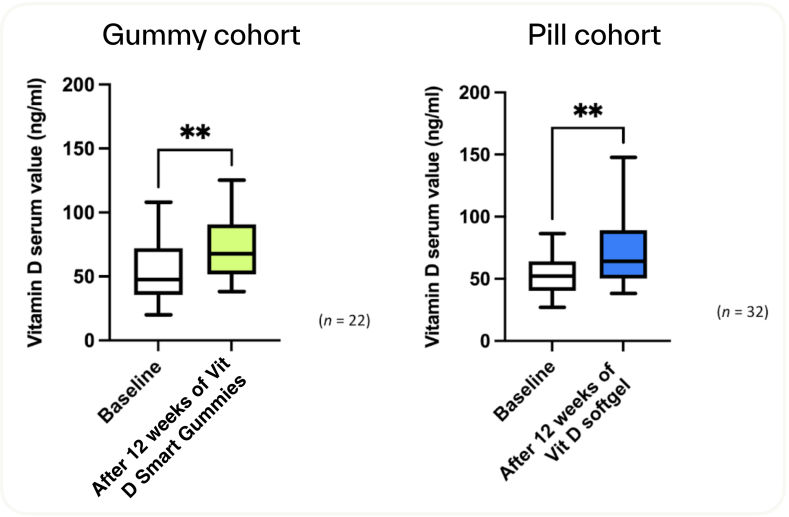
Figure 1. Significant improvement of the 25(OH)D3 blood serum levels of participants before and after supplementation with either the personalized vitamin D Elo Smart Gummy (n=22) or vitamin D softgel pill (n=32). The personalized vitamin D Smart Gummy supplement group (left) with P value = 0.0016, and vitamin D softgel (right) with P value = 0.0019. Wilcoxon matched-pairs signed-rank test, a non-parametric equivalent of the paired t-test, was used for data analysis.
Majority of study participants preferred gummies to pills
The personalized Elo Smart Gummy supplements were a popular alternative to traditional softgel pills and compliance was high, with 79% of those in the gummy intervention group reporting that they took their personalized Elo Smart Gummy supplement daily. Participants enjoyed the gummy supplement’s fun and easy-to-eat format, personalized dose, 3D-printed design, and taste. 63% of the gummy intervention group found the Smart Gummies more appealing and enjoyable than taking supplement pills.
“I enjoy and look forward to having my Smart Gummy compared to the pills, which are much harder to take.”
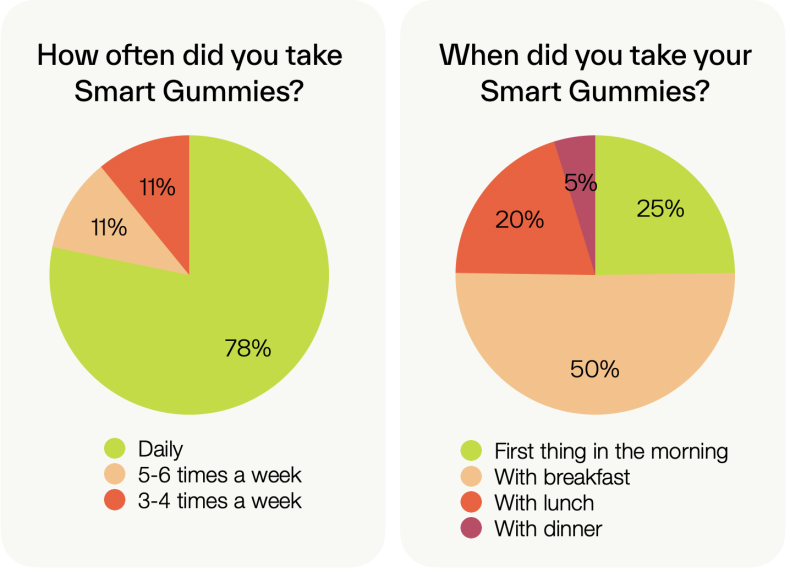
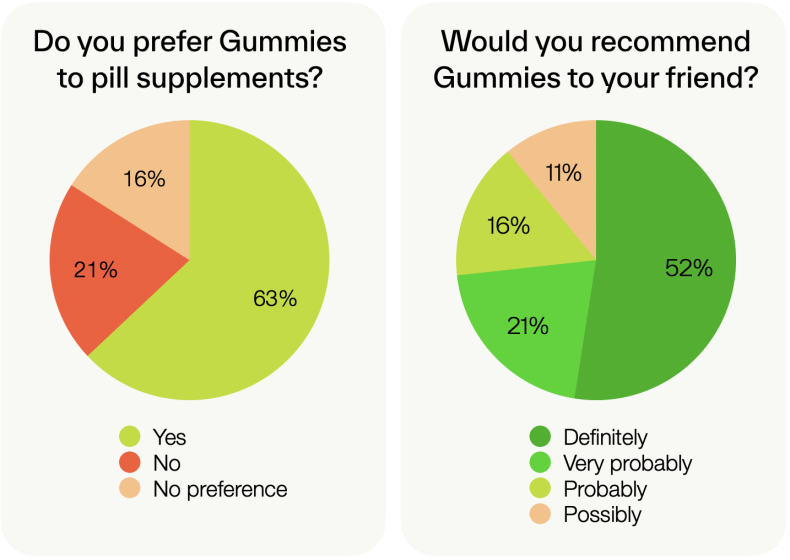
Preceding vitamin D gummy vs. pills study
Similarly, a recent study [6] investigated the importance of the formulation and vehicle used for vitamin D supplements in achieving targeted circulating vitamin D levels associated with various health outcomes. The study concluded that vitamin D gummies are absorbed more effectively in the gastrointestinal tract, and could be a more effective option for individuals who struggle with traditional pills.
Summary
The personalized vitamin D Smart Gummy supplements were equally effective in raising or maintaining vitamin D serum levels as vitamin D softgel pill supplements. The majority of participants in the intervention group preferred the personalized vitamin D Smart Gummy supplement compared to vitamin D softgel pills.
About the author
Zuzana Krejciova-Rajaniemi, PhD, is Elo Health's Director of Science. With a Doctor of Neuroscience degree from the University of Edinburgh, UK, focusing on neurodegenerative diseases and drug discovery, and over 15 years in the field, including work in a Nobel Laureate lab at UCSF, Zuzana possesses a profound understanding of cutting-edge scientific research. She is the driving force behind Elo's mission to empower members in managing their health and wellness through advanced scientific and clinical research, providing personalized and precise nutrient recommendations. In her free time she enjoys photography, spending time with her family, horse riding and hiking in the San Francisco Bay area where she lives. She used to be a competitive horseback gymnast, adding an extra layer to her diverse interests.
About Elo
Elo's big vision is to transform food from the cause of disease to medicine. 60% of the US adult population have one or more chronic conditions—and diet-related chronic conditions are the #1 cause of death in the US. Elo offers an array of Smart Nutrition products, including Smart Gummies, Smart Protein, and blood biomarker testing services.
About Nourished
Nourished uses innovative 3D-printed technology to create personalized nutrient gummy stacks packed full of high-impact ingredients and nutrients to revitalize your mind and body. Each bespoke gummy is sugar-free, vegan and wrapped in plastic-free and home-compostable packaging.
References
Amrein, K., Scherkl, M., Hoffmann, M., Neuwersch-Sommeregger, S., Köstenberger, M., Tmava Berisha, A., Martucci, G., Pilz, S., & Malle, O. (2020). Vitamin D deficiency 2.0: an update on the current status worldwide. European journal of clinical nutrition, 74(11), 1498–1513.
https://doi.org/10.1038/s41430-020-0558-y
Cashman K. D. (2020). Vitamin D Deficiency: Defining, Prevalence, Causes, and Strategies of Addressing. Calcified tissue international, 106(1), 14–29.
https://doi.org/10.1007/s00223-019-00559-4
Cashman, K. D., Dowling, K. G., Škrabáková, Z., Gonzalez-Gross, M., Valtueña, J., De Henauw, S., Moreno, L., Damsgaard, C. T., Michaelsen, K. F., Mølgaard, C., Jorde, R., Grimnes, G., Moschonis, G., Mavrogianni, C., Manios, Y., Thamm, M., Mensink, G. B., Rabenberg, M., Busch, M. A., Cox, L., … Kiely, M. (2016). Vitamin D deficiency in Europe: pandemic?. The American journal of clinical nutrition, 103(4), 1033–1044.
https://doi.org/10.3945/ajcn.115.120873
Schleicher, R. L., Sternberg, M. R., Looker, A. C., Yetley, E. A., Lacher, D. A., Sempos, C. T., Taylor, C. L., Durazo-Arvizu, R. A., Maw, K. L., Chaudhary-Webb, M., Johnson, C. L., & Pfeiffer, C. M. (2016). National Estimates of Serum Total 25-Hydroxyvitamin D and Metabolite Concentrations Measured by Liquid Chromatography-Tandem Mass Spectrometry in the US Population during 2007-2010. The Journal of nutrition, 146(5), 1051–1061.
https://doi.org/10.3945/jn.115.227728
Crowe, F. L., Jolly, K., MacArthur, C., Manaseki-Holland, S., Gittoes, N., Hewison, M., Scragg, R., & Nirantharakumar, K. (2019). Trends in the incidence of testing for vitamin D deficiency in primary care in the UK: a retrospective analysis of The Health Improvement Network (THIN), 2005-2015. BMJ open, 9(6), e028355.
https://doi.org/10.1136/bmjopen-2018-028355
Wagner, C. L., Shary, J. R., Nietert, P. J., Wahlquist, A. E., Ebeling, M. D., & Hollis, B. W. (2019). Bioequivalence Studies of Vitamin D Gummies and Tablets in Healthy Adults: Results of a Cross-Over Study. Nutrients, 11(5), 1023.
https://doi.org/10.3390/nu11051023


